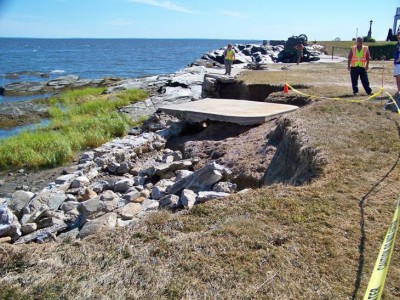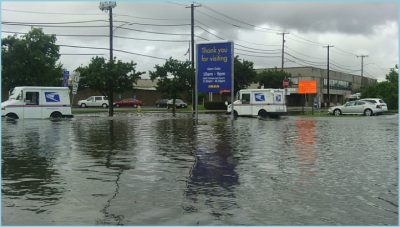2022 Municipal Resilience Grant Program: Resilience Financing and Project Development



The 2022 application process is closed and projects awarded
(subscribe to the Resilience Roundup newsletter to learn about future grant availability)
The Connecticut Institute for Resilience and Climate Adaptation (CIRCA) is requesting grant proposals from municipal governments, non-governmental organizations (NGOs) in partnership with municipalities, and councils of governments (COGs) for initiatives that advance two specific climate priorities for the state of Connecticut: 1) implementation of stormwater authorities, and 2) development of a resilience “project pipeline.” This funding supports the state’s recent legislation, An Act Concerning Climate Change Adaptation (PA 21-115), and recommendations of the Governor’s Council on Climate Change (GC3). Importantly, this funding expands the capacity of municipalities to address local resilience financing and project development needs.
Project proposals in either track described below should develop knowledge or concepts that are transferable to other communities and have well-defined and measurable goals. Applicants can submit proposals for both tracks, but only one proposal for each track. Projects should be completed in 12-months.
Eligible Applicants
Connecticut municipalities, NGOs in partnership with municipalities, and COGs.
Proposal Deadline
Applications were due February 1, 2022. Please check back here for future application availability.
A webinar to learn more about this grant funding was held on January 7, 2022 from 12:00 – 1:00 pm. WATCH RECORDING
Listen to a December 16, 2021 CT DEEP Climate Solutions webinar on the topic of Track 1 - Stormwater Authorities.
Track 1: Stormwater Authorities – $150,000 Available
In 2021, the Connecticut legislature passed PA 21-115 enabling municipalities to create a stormwater authority to help manage stormwater and improve resilience to climate change by assessing a scaled user fee based on the amount of stormwater a property generates. This new legislation can be used to generate funding to maintain and enhance resilient infrastructure and provide matching funds for state and federal grants. A new CIRCA fact sheet about Stormwater and Climate Resilience provides more information.
Applicants can request up to $100,000 for 12-month projects that support implementation of municipal stormwater authority programs through activities outlined in the four categories below. Since a goal of the program is to support transferable models for Storm Water Authority implementation, CIRCA anticipates making grants to Councils of Governments and large and small municipalities in both inland and coastal settings. CIRCA expects to make up to three awards in Track 1.
Depending on the stage of community planning, fundable Track 1 activities can include but are not limited to the following activities.
- Technical Tools:
-
- Ensure that parcel mapping is accurate to estimate areas of impervious surface.
- Map impervious surface areas at local sites to identify property owners who install, operate and maintain stormwater best management practices that reduce, retain, or treat stormwater onsite to incentivize resilience actions through stormwater authority fee reductions.
- Feasibility Study:
-
- Review existing stormwater facilities and regulatory requirements to determine condition, current operating costs, and areas where the system is inadequate and assess potential improvements.
- Determine if there are problem areas that require immediate or more funding than is currently available to address persistent, or projected increased stormwater impacts.
- Identify town / municipal boards, commissions, and agencies currently engaged in stormwater management.
- Review current funding for stormwater management; develop a fee structure (which necessitates understanding and quantifying how much is needed and how much can be collected).
- Design stormwater fee models, including fee collection and staff capacity for developing a billing system.
- Identify specific projects that the fee revenue could fund to decrease stormwater impacts and increase resilience.
-
- Community Outreach (to gauge and create support through information and engagement):
-
- Host a “Does it make sense?” workshop to assess community needs and interest.
- Inform community members through meetings or outreach materials that describe stormwater management, how the system is currently funded, and how fees could be equitably determined.
- Develop information/signage to educate the public and demonstrate how and where stormwater fees are being used to benefit the community.
- Implementation:
-
- Adopt an authorization ordinance tailored to the community enabling the stormwater authority.
- Develop a process for applying credits for land users that implement stormwater best management practices.
- Create a dedicated stormwater fund and include the fund in municipal budget projections.
- Begin assessment and fee collection.
- Keep community informed about fund use.
Track 2: Developing a Project Pipeline – $150,000 Available
Track 2 supports CIRCA’s goal to accelerate the implementation of projects to improve the resilience of the state’s natural and built environments, and the GC3 priority to create a resilience project pipeline. Municipal Hazard Mitigation Plans, Plans of Conservation and Development, and municipal resilience plans identify specific projects that address the impacts of climate change. The priority in Track 2 is to assist municipalities to develop and submit competitive proposals for state and federal programs that will fund the implementation of resilience projects.
CIRCA expects to make awards totaling $150,000 in Track 2. Applicants can request up to $50,000 for projects that can be implemented within a 12-month timeframe. Funding can be used to advance projects in various stages of the “project pipeline”, including:
- Preliminary design that could lead to benefit-cost analysis (BCA).
- BCA and other specific studies (e.g. environmental assessments, data collection, and/or development of project cost estimates) that support application(s) to federal funding sources
- Application materials for submittal to federal funding sources (e.g. FEMA's Hazard Mitigation Assistance (HMA) Program and NFWF’s National Coastal Resilience Fund).
How to Request Funds
APPLICATION REQUEST FORM
All materials will be submitted through the online application request form. In addition to the online form (see here for an example) you will also need to upload:
Detailed budget and budget justification. Responses should be limited to 2-3 pages in length. CIRCA reserves the right to request additional information.
Detailed project description and workplan – Please format your project description and workplan with the following sections:
- Project description (include project name and applicant address);
- Workplan (including timeline and deliverables);
- Resumes for team members;
- Partner roles and responsibilities (if applicable);
- Sources of leverage and amounts (if applicable);
- Define expected collaboration with CIRCA (if applicable) including technical analysis, mapping, or legal/policy guidance;
- Letters of support, including from benefitting municipalities (if COGs or NGOs are primary applicant).
Please describe your project, indicating the need for and intended use of the project. Please provide a detailed project description and work plan with all major phases and deliverables, including a timeline, and project team members with roles (attach a resume for each).
If you are partnering with an outside organization(s) please describe the partnership (roles and responsibilities) and detail any potential sources of leverage, including letters of support.
The combined project description and workplan should be limited to 5 pages in length (not included in the page count are resumes or letters of support).
Criteria for Evaluation
Track 1 and 2 proposals will be evaluated by a review committee consisting of CIRCA and state agency staff. The committee will weigh the following factors in their decision:
Does the proposed project:
- Identify and address a problem arising from climate change?
- Demonstrate the potential for success?
- Have concepts that can be transferred to other communities with the potential to demonstrate, pilot, or provide a proof of concept?
- Have measurable goals?
- Demonstrate existing community engagement?
- Include a support letter(s) demonstrating municipal leadership or benefit?
- Identify sources of leverage and amounts (if applicable)?
- Have a 12 month timeframe?
Track 2 projects have additional criteria that will be considered. Does the project:
- Identify a state or federal grant program targeted for primary funding?
- Demonstrate benefits across multiple sectors (e.g. transportation, environment, health, safety)?
- Include information (if applicable) on what permits are required and drawings and plans to be submitted in the permitting process?
Notification of Award
Applicants will be notified if they have been selected for funding within a month after their submission.
Contact Information
All questions should be directed to CIRCA_MunicipalFunds@uconn.edu. Please also see our Frequently Asked Questions (FAQ) page.
Reporting
Progress Report
Project leads will be required to provide a bi-annual progress report demonstrating progress and identifying challenges or areas in need of information and/or technical assistance.
Final Report
All awards are required to provide a final report to CIRCA that will include:
- Executive summary for non-technical audience (500 words);
- Project background and context;
- Project description, including goals and methods;
- Description of any CIRCA collaboration or research product(s) utilized;
- Outcomes and any lessons learned;
- Final project schedule; and
- Copies of products (manuscripts, maps, photos. presentations, tools, etc.)
Acknowledgement shall be given to the Connecticut Institute for Resilience and Climate Adaptation on any final products and presentations using information and guidance here: https://circa.uconn.edu/logo-acknowledgements/. CIRCA reserves the right to edit the final report in its entirety for publishing on the CIRCA website and/or including in print materials.
Required Information and Procedures
University of Connecticut award procedures must be followed by all entities selected to receive funds. Any entity that is funded must provide a detailed budget, budget justification, and scope of work. This is a contract for professional or technical services between the University and municipalities, COGs, or NGOs.
Funds will be dispersed in equal installments upon receipt of an interim progress report and final deliverable(s). General payment terms are subject to modification at the time of award.
FOIA Statement
The information and materials submitted to CIRCA for consideration under this funding program are subject to the terms of the Connecticut Freedom of Information Act ("FOIA") and all applicable rules, regulations and administrative decisions regarding their disclosure to third parties. The University is subject to the CT Freedom of Information Act, found in Chapter 14 of the CT General Statutes. Two exceptions may apply are as follows: (1) Conn. Gen. Stat. sec. 1-210(b)(24) permits the University to withhold records related to the procurement process while bidding and contract negotiations are underway (this moratorium is temporary and lasts only until the contract has been executed or negotiations are abandoned); and Conn. Gen. Stat. sec. 1-20(b)(5) permits the University to withhold records in its possession in the event they contain trade secrets (or really any intellectual property). In the event that the University determines that Conn. Gen. Stat. sec. 1-210(b)(5) may apply to a given request for the records in questions, the responsibility to substantiate claims that said would reveal trade secrets and meet the exemption requirements would need to be borne by the owner of said trade secrets, not the University.